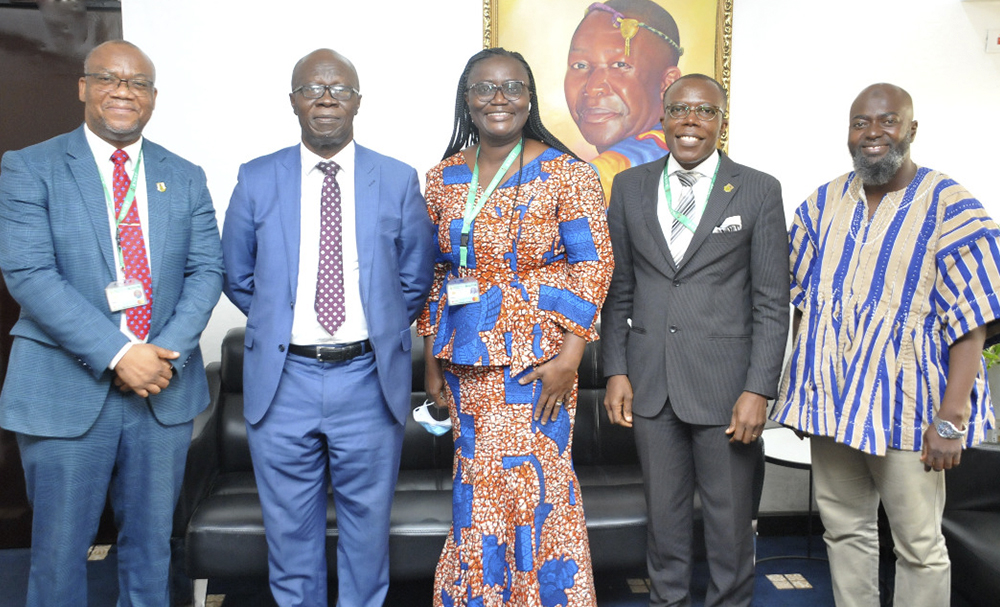KEEP NEWS
A CAD $1 Million Grant Has Been Awarded To The College Of Engineering To Establish A Multidisciplinary Responsible Artificial Intelligence Lab
Published: 30 Jan 2022

The Kwame Nkrumah University of Science and Technology (KNUST) has been awarded a grant to fund the establishment of a Responsible Artificial Intelligence Lab (RAIL) under the AI4D Africa Multidisciplinary Labs project initiated by International Development Research Centre (IDRC). RAIL has been envisioned as a Maker Space that would develop talents in Data Science and Machine Learning to help bridge the widening skills gap needed to champion the Digital Economic Transformation agenda of Ghana and the Sub-Region.
The activities in this Innovation Centre are specifically set to promote the digitalization of products, processes, and services via innovative toolbox development for Renewable Energies, Health, Agriculture, Climate Change use cases in close collaboration with local small and medium-sized enterprises (SMEs) and governmental bodies.
The CAD $1 Million Lab would be networked centrally and would also be decentralised to allow intelligent, flexible, and future-oriented collaboration across multiple sites using common IT equipment. The Faculty of Electrical and Computer Engineering would host this centrally networked lab infrastructure, which would provide computing, research, training, and expertise transfer to Universitée Alioune Diop de Bambey (Senegal), The University of Cape Verde, and The Gambia Technical Training Institute.
Prof. Jerry John Kponyo, who is the Principal Investigator (PI) and the Scientific Director of the Lab, in his initial reaction to the news of the grant award is grateful to IDRC and GIZ for jointly funding the setup of the Lab. He stressed the need to adopt collaboration and a multidisciplinary approach to solving the peculiar challenges in the sub-region. He is of the view that Artificial Intelligence holds the key to leveraging technologies to unlock the potential of highly talented young innovators in the sub-region. The PI also sees the funding as a mustard seed through which multiple initiatives could be developed to realize the African dream.
The Dean of Faculty of Electrical and Computer Engineering, Prof. Abdul-Rahman Ahmed, was also happy that the team he constituted to respond to the funding call with the help of the Office of Grants and Research (OGR) has worked diligently to make the RAIL project a reality. He further indicated that the RAIL project reinforces the faculty’s vision of developing strategic collaboration between academia, SMEs, and government actors to enable transfer-oriented cooperation between applied research, skills development, regional industry, entrepreneurs, and service providers to empower more players to engage in technology-based innovations in the sub-region.
The Provost of the College of Engineering, Prof. Mark Adom-Asamoah was excited about the prospects of the Lab and encouraged all key actors in the project implementation to work together to realize the ultimate objectives of the Lab.
The Vice-Chancellor of KNUST, Prof. (Mrs.) Rita Akosua Dickson, in congratulating the team indicated that the grant couldn’t have come at a better time. She urged the team to keep working hard to win more grants.
The project team is made up of Prof. Jerry John Kponyo (PI), Dr. Isaac Acquah, Dr. James Dzisi Gadze (HoD of Telecommunications Engineering), Dr. Eric Tutu Tchao, Mr. Andrew Selasi Agbemenu, Mrs. Christiana Selorm Aggor, Dr. Mrs. Eunice Akyereko, Dr. Henry Nunoo-Mensah, Mr. Benjamin Kommey, Prof. Francis Kemeausuor, and Dr. Christopher Appiah.
The Lab would be supported for three years to set up and run short courses in disruptive technologies and a master’s programme in Data Science and Machine Learning. RAIL would also provide research support to PhDs, advisory and extension services, policy formulation, and agenda-setting around Responsible Artificial Intelligence use. Further details on the AI4D programme can be found (here).
